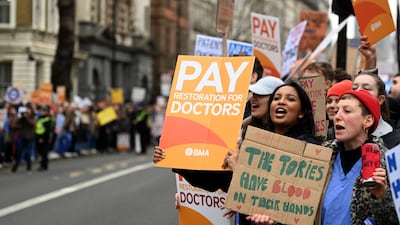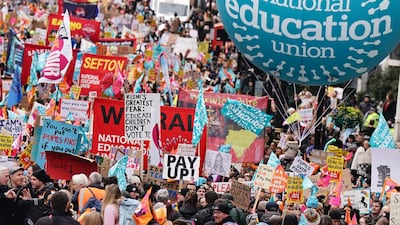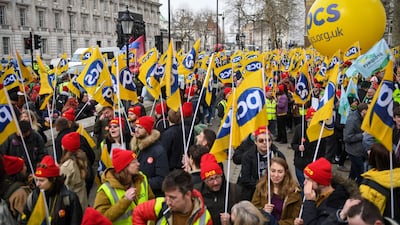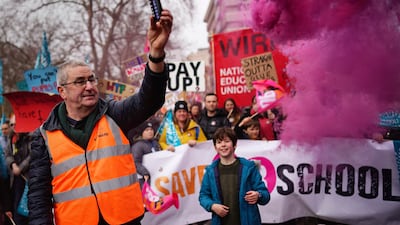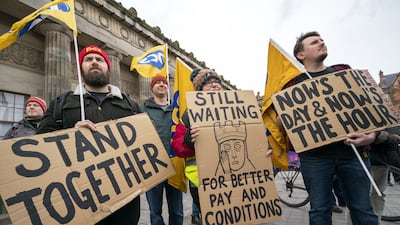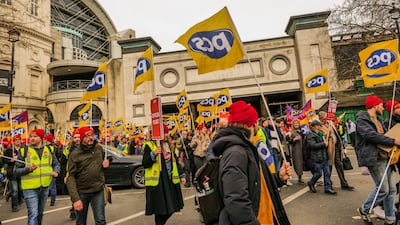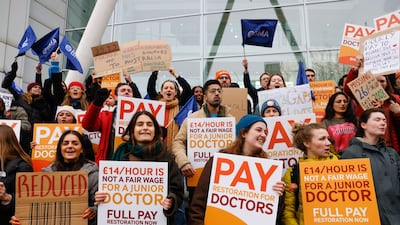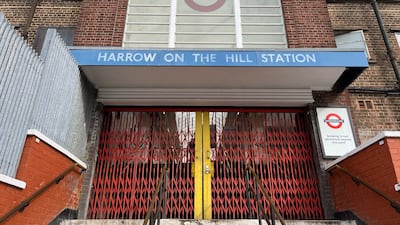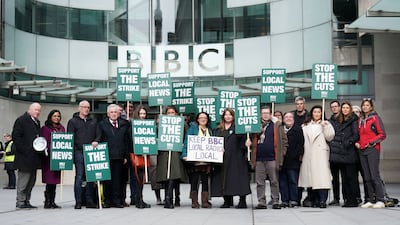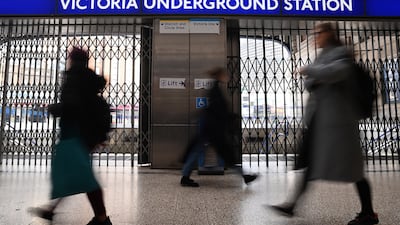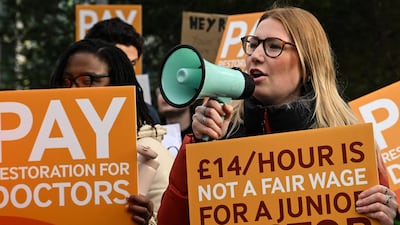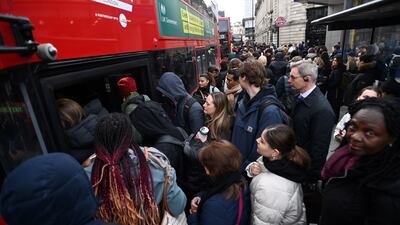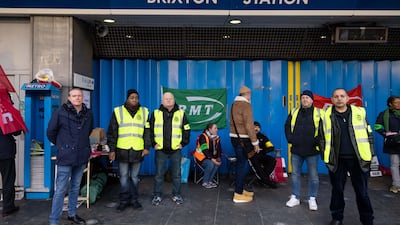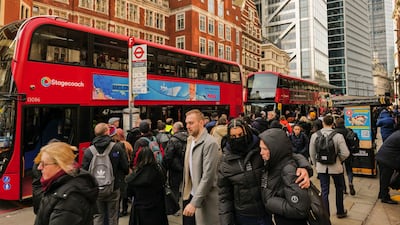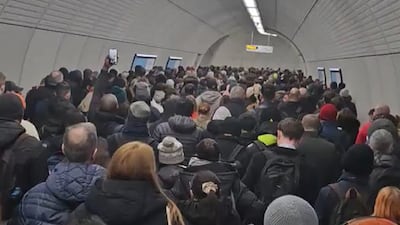The feeling of being ignored was palpable along the picket lines of teachers in Westminster on Wednesday, as thousands took part in a rally on a day of mass strikes.
Educators carrying colourful flags and home-made placards were among the throngs of workers who turned up to the protest in central London to call on Rishi Sunak’s government to increase funding for their sectors.
Teachers told The National they are “fed up” of having to work in underfunded schools and feel ignored by the Conservative government
Civil servants, junior doctors, university lecturers, London Underground drivers and BBC journalists participated in one of the biggest public sector walkouts since the wave of strikes began last summer.
Hundreds of picket lines were set up across the country as members of several trades unions downed tools and walked out amid continuing anger over issues such as pay, jobs, pensions and working conditions.
The strike coincided with Chancellor Jeremy Hunt's unveiling of his spring budget, which he touted as a “budget for growth”.
On the streets of Westminster, following a rally in Trafalgar Square, teachers were eager to make their voices heard.
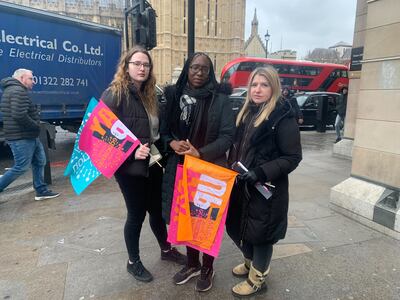
Katrina Downie, a teacher at a secondary school in Thurrock, Essex, said her head teacher is forced to choose between buying essential resources and hiring new staff members.
“We are tired, fed up and stressed out,” she explained as she sheltered from the rain in the shadow of the UK Parliament.
“We are working during lunchtimes and break times so that we can make sure the kids are looked after. It’s not fair on us and it’s not fair on the children.
“Our school is short-staffed but the money for upgrades to our school and buying the simplest things like glue sticks, pens and new computers comes out of the same pot as the money for new teachers.”
Her colleague Olga Adcock said their school, which has 1,200 pupils, is in desperate need of more teachers but the budget for salaries is simply not available.
She travelled to central London on Wednesday to “raise awareness of the issues facing schools and to make our voices heard”, and admitted she feels ignored by Mr Sunak and Mr Hunt.
“I feel like they don’t care about the future of children and they are not listening to us,” Ms Adcock said. “We feel that not enough money is being spent [on education]. It’s not right.”
'Parents would be shocked if they knew'
Rachel Claughan and Lisa Laverick travelled 450 kilometres from Durham to boldly push their message on the Prime Minister's doorstep.
The pair, who teach children with special needs, said their cash-strapped school in northern England is stretched to the seams. While staff are doing all they can to cater to the children, they are powerless to change a system that is ghastly underfunded, she said.
As a result, the pupils' education and mental health are suffering.
“It's a privilege to be with the kids but we worry if we are not given the resources to do our jobs,” Ms Claughan told The National. “My pupils have autism and complex needs. The space for them is just not there and they cannot cope. I teach 14 children and ideally it should be 10. It's eking up every year.
“Parents would be shocked if they found out how bad the state of education is.”
Ms Laverick said her school was built to cater to 96 children, yet 186 attend each day. Operating over capacity has forced staff to turn storage rooms and even closets into learning spaces.
“We have turned cupboards into classrooms,” she said with a look of concern. “The atmosphere is very busy for special needs children who need space.”
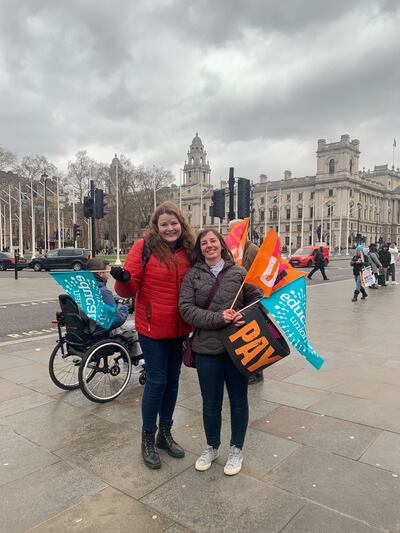
Outside St Thomas' Hospital in central London, junior doctor Leah Sugarman, 33, joined other strikers taking part in a three-day stoppage as they chanted: “What do we want? Fair pay! When do we want it? Now!”
The emergency medicine doctor, who has been on the job for nine years, said she cannot afford a mortgage and struggles to live a normal life.
“We’ve all lived through Covid — that was horrendous. Most of us have come out mentally scarred from that,'' she said. “And every day that I leave work, I pretty much want to cry because I haven’t been able to do the job that I chose to go into this profession for.”
She added that she has been forced to drop her hours to fewer than 40 a week “because I can’t mentally go to work full time any more”.
“It is just a car crash,'' she said. “So that’s why I’m here.”
Despite talks being held between unions and the Westminster government, the public sector strikes remain deadlocked.
Some, such as those by teachers, will be held only in England after progress was made in Wales and Scotland.
Public and Commercial Services union general secretary Mark Serwotka said the action was merely the start of strikes that could last until the end of the year.
“On budget day, we’re asking Chancellor Jeremy Hunt to give our hard-working members a fair pay rise,” he said.
“We’ve been given a 2 per cent pay rise when food inflation was 16 per cent last week. Forty thousand civil servants use food banks and 45,000 claim in-work benefits because they’re so poor.
“The government can stop these strikes today by putting money on the table for our members.
“If they don’t, our action will escalate. Where the Westminster government has a direct involvement in disputes, very little progress has been made.
“Shamefully, ministers don’t seem interested in giving their own employees a fair pay rise to help them through the cost-of-living crisis and beyond.”
Strikes in the UK on budget day — in pictures
Mary Bousted and Kevin Courtney, joint general secretaries of the National Education Union, said: “We do not want to go on strike, we want to be in the classroom, teaching and supporting children and young people.
“It continues to be a regret that our members have to take strike action, but we know that parents and the public understand the gravity of the situation around school funding and teacher recruitment and retention.
“The NEU, as we have always stated, is prepared to enter talks at any point, and as and when through negotiation a reasonable offer from government is made we will pause strike action while the offer is put to members.
“This is exactly what happened last week in Wales. [Education Secretary] Gillian Keegan needs to take a leaf out of the Welsh government’s book, stop playing politics and get down to serious negotiation.”
Passengers were urged to check before travelling by Tube in London because of disruption caused by a strike by members of Aslef and the Rail, Maritime and Transport union.
In a letter to the London mayor, RMT general secretary Mick Lynch said: “As you know, at this moment, London Underground managers are imposing new rosters across our Tube stations, which are based on cutting 600 station staff jobs.
“In January, I wrote to you raising my serious concerns about the safety consequences of these cuts. Because they are now so short-staffed, managers appear to be misusing waivers in order to override agreed minimum safe staffing levels at Tube stations.
“This means that stations are now opening with too few or, in some cases, no staff. I asked for a moratorium on these station staff cuts while an investigation took place, yet managers are proceeding with the use of the new rosters.”
Finn Brennan of Aslef said the government’s failure to properly fund public transport in the capital was to blame.
He warned that further strikes were inevitable unless the row was resolved.
Glynn Barton, Transport for London’s chief operating officer, said: “Customers should check before they travel and we are advising them to expect very limited or no service on the Tube on Wednesday.
“The majority of TfL services will be running as normal but may be subject to last-minute changes, including non-stopping at some stations shared with London Underground.
“Disruption should be expected on the Tube network into the morning on Thursday.”
Members of the National Union of Journalists working at BBC Local across England will stage a 24-hour strike in a row over programme cuts.
Meanwhile, Wednesday will be the final day of a three-day stoppage launched by junior doctors in the British Medical Association on Monday over pay.
“So far, so difficult for the NHS — but the health service is still there for patients,” NHS Providers chief executive Sir Julian Hartley said.
“Unlike previous strikes, it’s noticeable that there has been no let-up in the demand for care.
“Senior doctors are stepping into the breach but it isn’t business as usual. For hospital patients, that means it’s taking longer for admissions and the discharge process is also slower.
“Ambulance handover delays are up, too.
“We’re seeing increased levels of cover by senior doctors in mental health and community services but it isn’t sustainable and trust leaders are worried about ‘burning goodwill’.
“The planning effort involved in preparing for the strike and keeping services going has been huge and has taken leaders’ time away from other work. We can’t go on like this. The knock-on effects of a three-day strike will be felt for a long time to come.
“We need the government and the doctors’ unions to come to an agreement quickly.”
Mike Clancy, general secretary of Prospect, said: “Our members in the public sector have seen their incomes decline by up to 26 per cent over the past 13 years and their work taken for granted — they have had enough.
“Poor pay and declining morale represent an existential threat to the Civil Service’s ability to function, and to our ability to regulate and deliver on the government’s priorities.
“Bills are rocketing and pay is falling ever further behind the private sector, leaving our members with no option but to take industrial action.
“We will continue our campaign until the government comes up with a meaningful offer. If it doesn’t do so soon, we may be left with no Civil Service to protect.”
